过去将来进行时
过去将来进行时
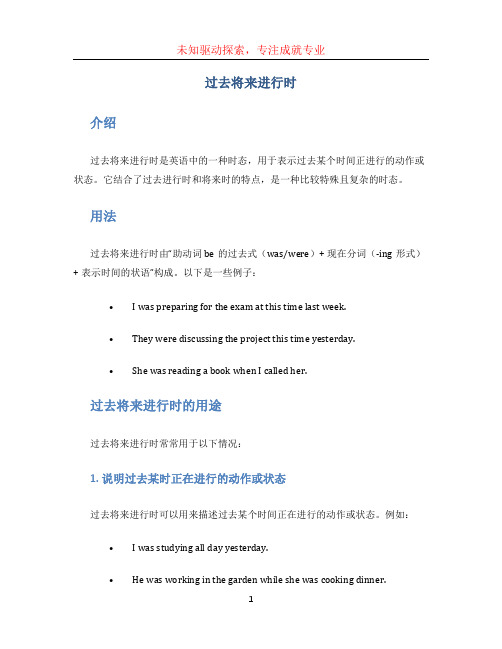
过去将来进行时介绍过去将来进行时是英语中的一种时态,用于表示过去某个时间正进行的动作或状态。
它结合了过去进行时和将来时的特点,是一种比较特殊且复杂的时态。
用法过去将来进行时由“助动词be的过去式(was/were)+ 现在分词(-ing形式)+ 表示时间的状语”构成。
以下是一些例子:•I was preparing for the exam at this time last week.•They were discussing the project this time yesterday.•She was reading a book when I called her.过去将来进行时的用途过去将来进行时常常用于以下情况:1. 说明过去某时正在进行的动作或状态过去将来进行时可以用来描述过去某个时间正在进行的动作或状态。
例如:•I was studying all day yesterday.•He was working in the garden while she was cooking dinner.2. 提供过去某时的上下文背景过去将来进行时可以用来提供过去某个时间的上下文背景,使听者或读者更好地理解故事发展。
例如:•It was raining heavily. He was waiting for the bus when I saw him.•She was talking on the phone when the doorbell rang.3. 表示过去某个时间的计划或安排过去将来进行时可以用来表示过去某个时间的计划或安排,即过去对将来的描述。
例如:•We were planning to go on vacation, but we had to cancel due to the bad weather.•They were going to get married next month, but they broke up before then.注意事项使用过去将来进行时时,需要注意一些细节:1. 只能在过去时间中使用过去将来进行时只能用于描述过去发生的动作或状态,不能用于现在或将来的情况。
英语语法过去将来进行时
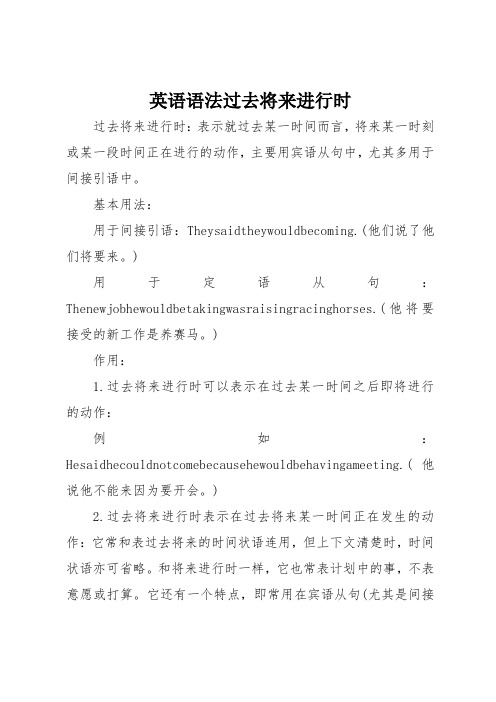
英语语法过去将来进行时过去将来进行时:表示就过去某一时间而言,将来某一时刻或某一段时间正在进行的动作,主要用宾语从句中,尤其多用于间接引语中。
基本用法:用于间接引语:Theysaidtheywouldbecoming.(他们说了他们将要来。
)用于定语从句:Thenewjobhewouldbetakingwasraisingracinghorses.(他将要接受的新工作是养赛马。
)作用:1.过去将来进行时可以表示在过去某一时间之后即将进行的动作:例如:Hesaidhecouldnotcomebecausehewouldbehavingameeting.(他说他不能来因为要开会。
)2.过去将来进行时表示在过去将来某一时间正在发生的动作:它常和表过去将来的时间状语连用,但上下文清楚时,时间状语亦可省略。
和将来进行时一样,它也常表计划中的事,不表意愿或打算。
它还有一个特点,即常用在宾语从句(尤其是间接引语)中。
例如:JohntoldusthatMarywouldbecomingnextday.(约翰告诉我们玛丽第二天来。
)3.过去将来进行时有时也可用在其它从句中:用在定语从句中:ThenewnamehewouldbeusingwasJackJones.(他将用的新名是杰克琼斯。
)用在状语从句中:HewouldpaytherestashewouldbeleavingFrance.(其余款项,他将在离开法国时付清。
)4.过去将来进行时也可用在独立句中:例如:Thecarstarted.EllenJameswouldbedrivingofftotheuniversit y.(车子发动了。
埃伦詹姆斯要开车到大学去。
)。
过去将来进行时的结构和用法

过去将来进行时的结构和用法
1. 嘿,你知道过去将来进行时是什么样的吗?就像我们计划好了明天要做一件大事,比如说“我下周这个时候正在努力学习呢”,这就是过去将来进行时在生活中的运用呀!
2. 想想看呀,过去将来进行时不就是一种对未来在过去视角下的持续动作的描述嘛!比如说“他昨天说他今天下午会一直在花园里浇花”,这多形象啊!
3. 哇塞,过去将来进行时就像是在时间隧道里穿行的奇妙魔法呀!例如“她上周还在想下个月这个时候她会一直在练钢琴呢”,是不是感觉很有趣?
4. 哎呀,过去将来进行时有多重要呢?就好像你回忆过去,想象某个时刻自己正在做的事情,“他们去年就说今年冬天会一直坚持晨跑”,这就是呀!
5. 嘿呀,过去将来进行时是不是很神奇呢?就像“我早先说过暑假里我会一直在学游泳”,这不就是对过去的未来的一种描述吗?
6. 天呐,过去将来进行时不就是我们回忆里那些即将发生的持续动作嘛!比如“你曾经讲过考试那天你会一直在认真答题”。
7. 哇哦,过去将来进行时,那可是连接过去和未来的桥梁呀!像是“她之前保证过下个月这时候她会一直在尝试新菜谱”。
8. 哟呵,过去将来进行时很容易理解的呀!比如“他昨天说今天晚上会一直在看他喜欢的电影”。
9. 所以啊,过去将来进行时就是这么简单又好用,能让我们表达出那些过去想象中的未来持续动作呢!。
动词时态掌握过去现在和将来的正确用法

动词时态掌握过去现在和将来的正确用法动词时态是语法中一个非常重要的概念,它用来表示动作或状态发生的时间。
正确使用动词时态可以帮助我们准确表达过去、现在和将来的动作,增强语言的准确性和流畅性。
本文将围绕过去、现在和将来的动作分别介绍其正确的时态使用。
过去时态过去时态表示在过去某个时间点或某个时间段发生的动作或状态。
过去时态常用的几种形式包括简单过去时、过去进行时、过去完成时以及过去完成进行时。
1. 简单过去时:动词的过去式形式表示一种已经结束的或持续了一段时间的动作或状态。
例句:I walked to the park yesterday.(昨天我走到了公园。
)例句:She studied hard for the exam last night.(昨晚她为了考试努力学习。
)2. 过去进行时:be动词的过去式加上动词的ing形式表示过去某一时刻或某一段时间里正在进行的动作。
例句:They were playing soccer when it started to rain.(当下雨时他们正在踢足球。
)例句:I was watching TV when she called me.(她给我打电话时我正在看电视。
)3. 过去完成时:had + 过去分词形式表示在过去某个时间点之前已经完成的动作或状态。
例句:They had already left when I arrived.(我到达时他们已经走了。
)例句:She had finished her homework before dinner.(吃晚饭之前她已经完成了作业。
)4. 过去完成进行时:had been + 动词的ing形式表示过去某一时刻之前一直在进行的动作。
例句:He had been studying for hours before he finally took a break.(他在休息之前已经学习了几个小时。
)例句:She had been waiting at the bus stop for 20 minutes before the bus finally arrived.(公交车终于到站时,她在车站等了20分钟。
过去将来进行时例句

过去将来进行时例句一、什么是过去将来进行时虽然过去将来进行时在英语语法中不常见,但在某些特定情况下可以使用。
过去将来进行时表示过去时间点之前已经计划或决定好的动作或事件,这些动作或事件本应在过去的某个时间点发生,但却没有实现,而是继续在过去的某个时间点之后进行。
下面是一些使用过去将来进行时的特定场景例句。
二、使用过去将来进行时的特定场景例句2.1 旅行计划1.I was going to visit Europe last summer, but then the pandemichappened and I had to cancel my trip.2.We had planned to go hiking in the mountains, but it startedraining heavily, so we had to change our plans.3.They had intended to spend their vacation in Hawaii, but then ahurricane hit the island and they had to postpone their trip.2.2 项目延期1.The construction of the new stadium was supposed to finish lastyear, but due to funding issues, it is still ongoing.2.Our team had scheduled the product launch for next month, but dueto production delays, we had to push it back to the end of theyear.3.The conference was originally planned to take place in person, butdue to the pandemic, it had to be moved online.2.3 未实现的计划1.She had been planning to buy a new car, but then she lost her joband her financial situation changed.2.They had intended to start their own business, but they couldn’tsecure enough funding, so they had to put the plan on hold.3.I had been thinking about studying abroad, but then I got a joboffer th at I couldn’t refuse.2.4 邀请和安排1.My friends had invited me to their party, but I had already madeplans to attend a wedding on the same day.2.The company had scheduled a meeting for tomorrow morning, but dueto a sudden emergency, it had to be postponed.3.He had arranged to meet with his client yesterday, but the clientcalled to reschedule at the last minute.三、总结过去将来进行时是指某个过去的时间点之前已经计划或决定好的动作或事件,在过去的某个时间点之后继续进行。
英语过去将来进行 完成时解析

英语过去将来进行完成时解析过去将来进行时是英语表达中的一种语法时态,表示就过去某一时间而言,将来某一时刻或某一段时间正在进行的动作。
主要用于宾语从句中,尤其多用于间接引语中。
构成:1.过去将来进行时由主语+should(would)+be+现在分词2.否定:主语+should(would)+not+be+现在分词3.疑问:should(would)+主语+be+现在分词(+其他)基本用法:用于间接引语:They said they would be coming.(他们说了他们将要来。
)用于定语从句:The new job he would be taking was raising racing horses.(他将要接受的新工作是养赛马。
)作用:1. 过去将来进行时可以表示在过去某一时间之后即将进行的动作:例如:He said he could not come because he would be having a meeting.(他说他不能来因为要开会。
)2. 过去将来进行时表示在过去将来某一时间正在发生的动作:它常和表过去将来的时间状语连用,但上下文清楚时,时间状语亦可省略。
和将来进行时一样,它也常表计划中的事,不表意愿或打算。
它还有一个特点,即常用在宾语从句(尤其是间接引语)中。
例如:John told us that Mary would be coming next day.(约翰告诉我们玛丽第二天来。
)3. 过去将来进行时有时也可用在其它从句中:用在定语从句中:The new name he would be using was Jack Jones.(他将用的新名是杰克•琼斯。
)用在状语从句中:He would pay the rest as he would be leaving France.(其余款项,他将在离开法国时付清。
)4. 过去将来进行时也可用在独立句中:例如:The car started. Ellen James would be driving off to the university.(车子发动了。
英语语法-过去将来进行时
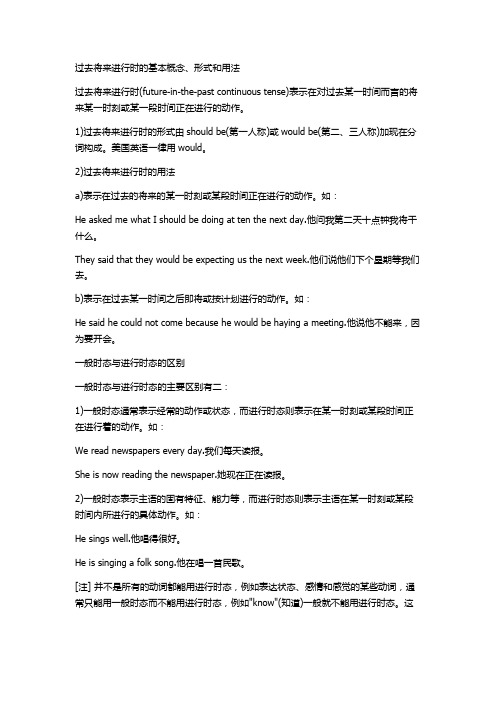
过去将来进行时的基本概念、形式和用法过去将来进行时(future-in-the-past continuous tense)表示在对过去某一时间而言的将来某一时刻或某一段时间正在进行的动作。
1)过去将来进行时的形式由should be(第一人称)或would be(第二、三人称)加现在分词构成。
美国英语一律用would。
2)过去将来进行时的用法a)表示在过去的将来的某一时刻或某段时间正在进行的动作。
如:He asked me what I should be doing at ten the next day.他问我第二天十点钟我将干什么。
They said that they would be expecting us the next week.他们说他们下个星期等我们去。
b)表示在过去某一时间之后即将或按计划进行的动作。
如:He said he could not come because he would be haying a meeting.他说他不能来,因为要开会。
一般时态与进行时态的区别一般时态与进行时态的主要区别有二:1)一般时态通常表示经常的动作或状态,而进行时态则表示在某一时刻或某段时间正在进行着的动作。
如:We read newspapers every day.我们每天读报。
She is now reading the newspaper.她现在正在读报。
2)一般时态表示主语的固有特征、能力等,而进行时态则表示主语在某一时刻或某段时间内所进行的具体动作。
如:He sings well.他唱得很好。
He is singing a folk song.他在唱一首民歌。
[注] 并不是所有的动词都能用进行时态,例如表达状态、感情和感觉的某些动词,通常只能用一般时态而不能用进行时态,例如"know"(知道)一般就不能用进行时态。
这类动词还有be(是),have(有),1ove (爱),hate(恨),want(想要),1ike(喜欢),think(认为),believe(相信),see(看见),hear(听见)等。
现在·将来·过去·进行时态

动词的时态一般现在时一般现在时v. /v.s am /is /are + Vp.p 一般过去时一般过去时v-ed was / were + Vp.p 一般将来时一般将来时will + v. will be + Vp.p 过去将来时过去将来时would + v. would be + Vp.p 过去完成时过去完成时had + Vp.p had been + Vp.p 现在完成时现在完成时have /has + Vp.p have /has been + Vp.p 将来完成时将来完成时 will have + Vp.p will have been + Vp.p 现在进行时现在进行时 am /is / are Ving am /is /are + being + Vp.p 过去进行时过去进行时 was /were + Ving was /were + being + Vp.p 一、一般现在时一般现在时表示经常发生的动作(习惯性的动作)或存在的状态,等句中常用always, usually, often, sometimes, seldom, never, every day时间状语。
时间状语。
1 一般现在时的用法一般现在时的用法1)经常性或习惯性的动作经常性或习惯性的动作I ______ ping-pong quite well, but I haven’t had time to play since the new year. A .will play B. have played C. played D. play 2)客观真理,客观存在,科学事实或表示格言或警句。
客观真理,客观存在,科学事实或表示格言或警句。
① Knowledge begins with practice. ② She said that the sea water is salty. 3)按火车、汽车、飞机等时刻表将要发生的事。
将来进行时和过去将来时
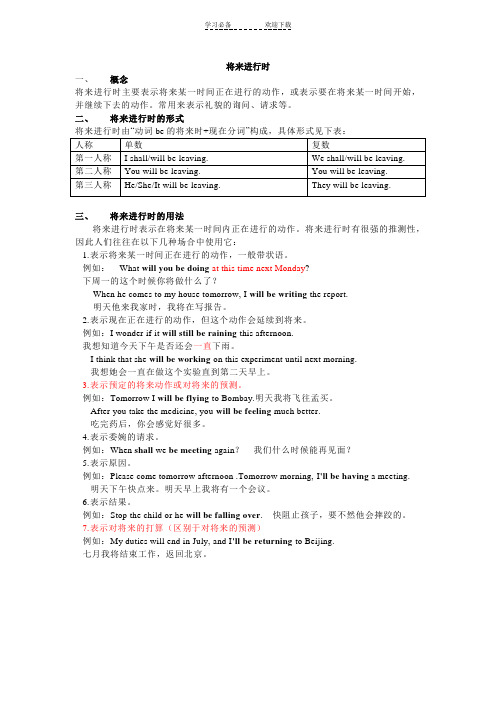
将来进行时一、概念将来进行时主要表示将来某一时间正在进行的动作,或表示要在将来某一时间开始,并继续下去的动作。
常用来表示礼貌的询问、请求等。
二、将来进行时的形式将来进行时由“动词be的将来时+现在分词”构成,具体形式见下表:三、将来进行时的用法将来进行时表示在将来某一时间内正在进行的动作。
将来进行时有很强的推测性,因此人们往往在以下几种场合中使用它:1.表示将来某一时间正在进行的动作,一般带状语。
例如:What will you be doing at this time next Monday?下周一的这个时候你将做什么了?When he comes to my house tomorrow, I will be writing the report.明天他来我家时,我将在写报告。
2.表示现在正在进行的动作,但这个动作会延续到将来。
例如:I wonder if it will still be raining this afternoon.我想知道今天下午是否还会一直下雨。
I think that she will be working on this experiment until next morning.我想她会一直在做这个实验直到第二天早上。
3.表示预定的将来动作或对将来的预测。
例如:Tomorrow I will be flying to Bombay.明天我将飞往孟买。
After you take the medicine, you will be feeling much better.吃完药后,你会感觉好很多。
4.表示委婉的请求。
例如:When shall we be meeting again?我们什么时候能再见面?5.表示原因。
例如:Please come tomorrow afternoon .Tomorrow morning, I'll be having a meeting.明天下午快点来。
过去进行时和将来进行时
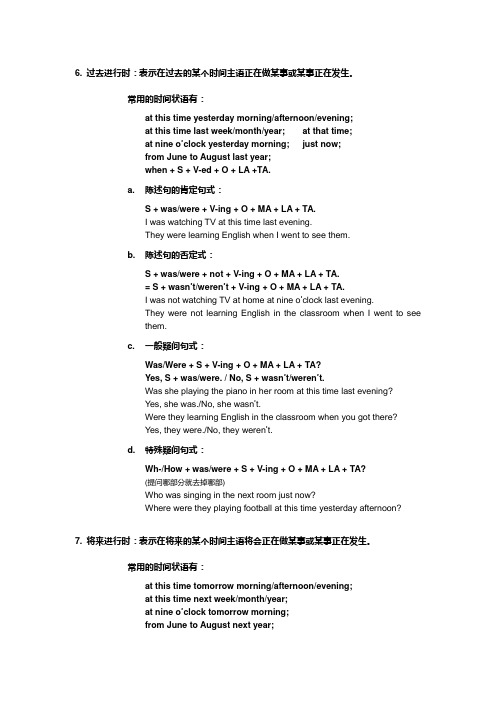
6. 过去进行时:表示在过去的某个时间主语正在做某事或某事正在发生。
常用的时间状语有:at this time yesterday morning/afternoon/evening;at this time last week/month/year; at that time;at nine o’clock yesterday morning; just now;from June to August last year;when + S + V-ed + O + LA +TA.a. 陈述句的肯定句式:S + was/were + V-ing + O + MA + LA + TA.I was watching TV at this time last evening.They were learning English when I went to see them.b. 陈述句的否定式:S + was/were + not + V-ing + O + MA + LA + TA.= S + wasn’t/weren’t + V-ing + O + MA + LA + TA.I was not watching TV at home at nine o’clock last evening.They were not learning English in the classroom when I went to seethem.c. 一般疑问句式:Was/Were + S + V-ing + O + MA + LA + TA?Yes, S + was/were. / No, S + wasn’t/weren’t.Was she playing the piano in her room at this time last evening?Yes, she was./No, she wasn’t.Were they learning English in the classroom when you got there?Yes, they were./No, they weren’t.d. 特殊疑问句式:Wh-/How + was/were + S + V-ing + O + MA + LA + TA?(提问哪部分就去掉哪部)Who was singing in the next room just now?Where were they playing football at this time yesterday afternoon?7. 将来进行时:表示在将来的某个时间主语将会正在做某事或某事正在发生。
英语语法:过去将来进行时详解
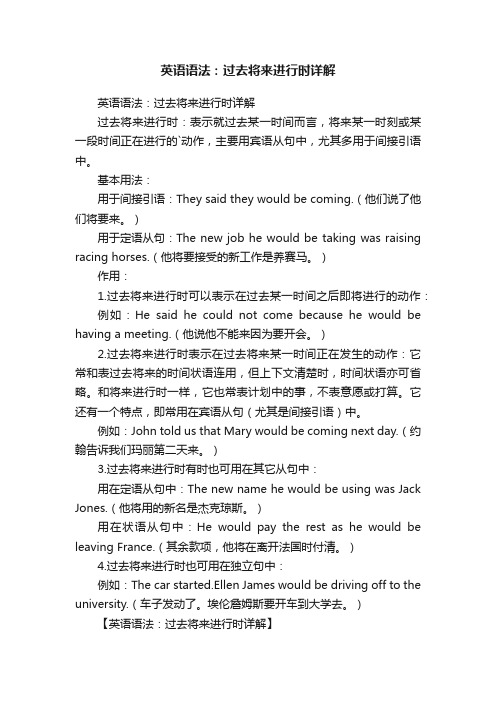
英语语法:过去将来进行时详解英语语法:过去将来进行时详解过去将来进行时:表示就过去某一时间而言,将来某一时刻或某一段时间正在进行的`动作,主要用宾语从句中,尤其多用于间接引语中。
基本用法:用于间接引语:They said they would be coming.(他们说了他们将要来。
)用于定语从句:The new job he would be taking was raising racing horses.(他将要接受的新工作是养赛马。
)作用:1.过去将来进行时可以表示在过去某一时间之后即将进行的动作:例如:He said he could not come because he would be having a meeting.(他说他不能来因为要开会。
)2.过去将来进行时表示在过去将来某一时间正在发生的动作:它常和表过去将来的时间状语连用,但上下文清楚时,时间状语亦可省略。
和将来进行时一样,它也常表计划中的事,不表意愿或打算。
它还有一个特点,即常用在宾语从句(尤其是间接引语)中。
例如:John told us that Mary would be coming next day.(约翰告诉我们玛丽第二天来。
)3.过去将来进行时有时也可用在其它从句中:用在定语从句中:The new name he would be using was Jack Jones.(他将用的新名是杰克琼斯。
)用在状语从句中:He would pay the rest as he would be leaving France.(其余款项,他将在离开法国时付清。
)4.过去将来进行时也可用在独立句中:例如:The car started.Ellen James would be driving off to the university.(车子发动了。
埃伦詹姆斯要开车到大学去。
)【英语语法:过去将来进行时详解】。
过去将来进行时例句
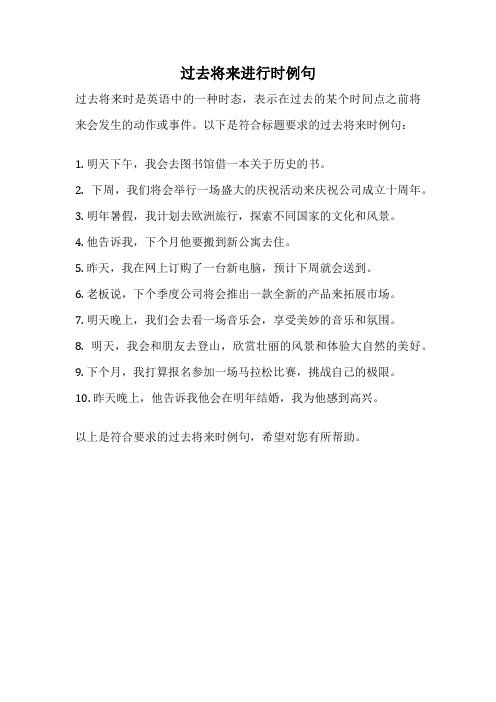
过去将来进行时例句
过去将来时是英语中的一种时态,表示在过去的某个时间点之前将来会发生的动作或事件。
以下是符合标题要求的过去将来时例句:
1. 明天下午,我会去图书馆借一本关于历史的书。
2. 下周,我们将会举行一场盛大的庆祝活动来庆祝公司成立十周年。
3. 明年暑假,我计划去欧洲旅行,探索不同国家的文化和风景。
4. 他告诉我,下个月他要搬到新公寓去住。
5. 昨天,我在网上订购了一台新电脑,预计下周就会送到。
6. 老板说,下个季度公司将会推出一款全新的产品来拓展市场。
7. 明天晚上,我们会去看一场音乐会,享受美妙的音乐和氛围。
8. 明天,我会和朋友去登山,欣赏壮丽的风景和体验大自然的美好。
9. 下个月,我打算报名参加一场马拉松比赛,挑战自己的极限。
10. 昨天晚上,他告诉我他会在明年结婚,我为他感到高兴。
以上是符合要求的过去将来时例句,希望对您有所帮助。
过去将来进行时
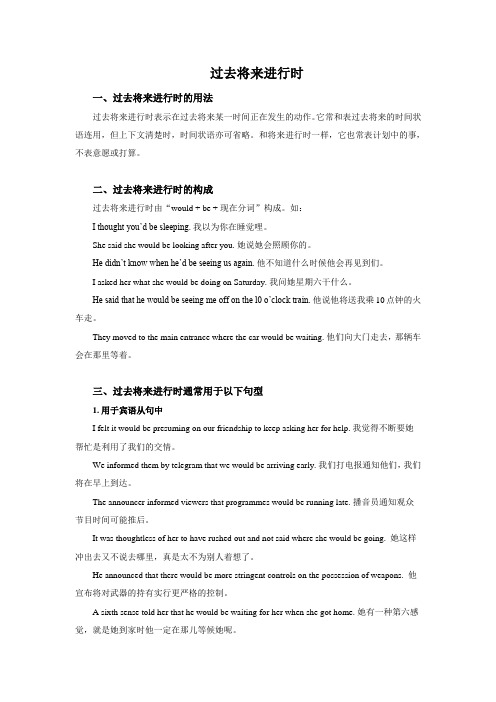
过去将来进行时一、过去将来进行时的用法过去将来进行时表示在过去将来某一时间正在发生的动作。
它常和表过去将来的时间状语连用,但上下文清楚时,时间状语亦可省略。
和将来进行时一样,它也常表计划中的事,不表意愿或打算。
二、过去将来进行时的构成过去将来进行时由“would + be + 现在分词”构成。
如:I thought you’d be sleeping.我以为你在睡觉哩。
She said she would be looking after you. 她说她会照顾你的。
He didn’t know when he’d be seeing us again.他不知道什么时候他会再见到们。
I asked her what she would be doing on Saturday. 我问她星期六干什么。
He said that he would be seeing me off on the l0 o’clock train.他说他将送我乘10点钟的火车走。
They moved to the main entrance where the car would be waiting. 他们向大门走去,那辆车会在那里等着。
三、过去将来进行时通常用于以下句型1. 用于宾语从句中I felt it would be presuming on our friendship to keep asking her for help. 我觉得不断要她帮忙是利用了我们的交情。
We informed them by telegram that we would be arriving early. 我们打电报通知他们,我们将在早上到达。
The announcer informed viewers that programmes would be running late. 播音员通知观众节目时间可能推后。
It was thoughtless of her to have rushed out and not said where she would be going. 她这样冲出去又不说去哪里,真是太不为别人着想了。
过去将来进行时的用法
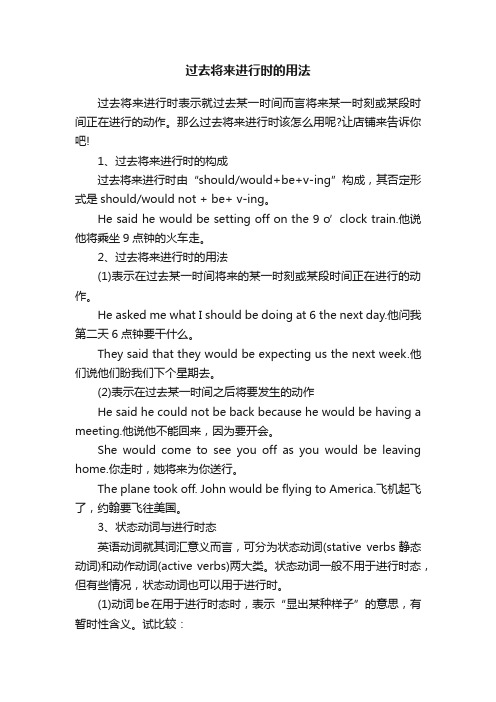
过去将来进行时的用法过去将来进行时表示就过去某一时间而言将来某一时刻或某段时间正在进行的动作。
那么过去将来进行时该怎么用呢?让店铺来告诉你吧!1、过去将来进行时的构成过去将来进行时由“should/would+be+v-ing”构成,其否定形式是should/would not + be+ v-ing。
He said he would be setting off on the 9 o’clock train.他说他将乘坐9点钟的火车走。
2、过去将来进行时的用法(1)表示在过去某一时间将来的某一时刻或某段时间正在进行的动作。
He asked me what I should be doing at 6 the next day.他问我第二天6点钟要干什么。
They said that they would be expecting us the next week.他们说他们盼我们下个星期去。
(2)表示在过去某一时间之后将要发生的动作He said he could not be back because he would be having a meeting.他说他不能回来,因为要开会。
She would come to see you off as you would be leaving home.你走时,她将来为你送行。
The plane took off. John would be flying to America.飞机起飞了,约翰要飞往美国。
3、状态动词与进行时态英语动词就其词汇意义而言,可分为状态动词(stative verbs静态动词)和动作动词(active verbs)两大类。
状态动词一般不用于进行时态,但有些情况,状态动词也可以用于进行时。
(1)动词be在用于进行时态时,表示“显出某种样子”的意思,有暂时性含义。
试比较:He is strong.他很强壮。
(持续性)He is being strong.他显得很壮。
过去将来进行时的结构及用法(一)
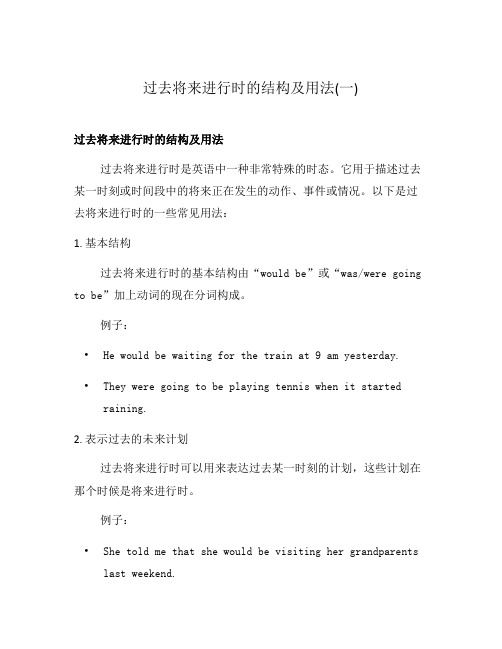
过去将来进行时的结构及用法(一)过去将来进行时的结构及用法过去将来进行时是英语中一种非常特殊的时态。
它用于描述过去某一时刻或时间段中的将来正在发生的动作、事件或情况。
以下是过去将来进行时的一些常见用法:1. 基本结构过去将来进行时的基本结构由“would be”或“was/were going to be”加上动词的现在分词构成。
例子:•He would be waiting for the train at 9 am yesterday. •They were going to be playing tennis when it started raining.2. 表示过去的未来计划过去将来进行时可以用来表达过去某一时刻的计划,这些计划在那个时候是将来进行时。
例子:•She told me that she would be visiting her grandparents last weekend.•We were going to be having a party at our place yesterday.3. 表示过去的未来安排过去将来进行时可以用于描述过去某一时刻的安排,这些安排在那个时候是将来进行时。
例子:•They were going to be flying to London at 8 pm last night.•He said he would be meeting his friend for dinner after work yesterday.4. 表示过去的未来推测过去将来进行时还可以用于推测过去某一时刻的将来情况,表示对那个时候的猜测。
例子:•I thought she would be studying for her exam all night yesterday.•They were going to be working on their project until late last evening.5. 表示过去情况下的反悔或不满意过去将来进行时还可以用来表达对过去某一时刻的不满意、反悔或遗憾。
过去将来进行时 用法
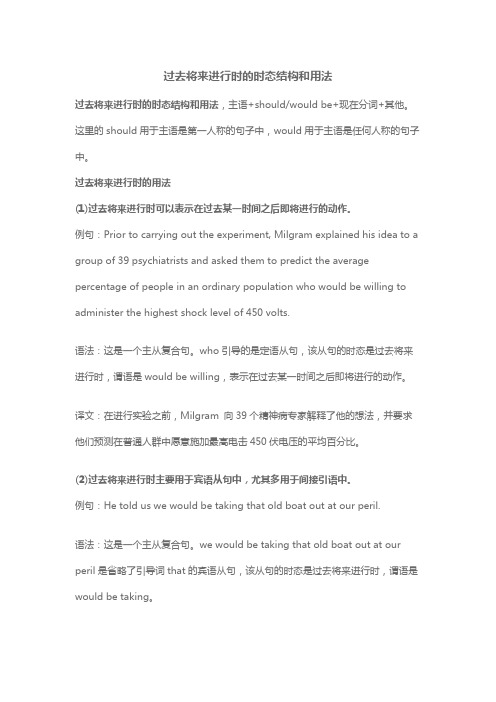
过去将来进行时的时态结构和用法过去将来进行时的时态结构和用法,主语+should/would be+现在分词+其他。
这里的should用于主语是第一人称的句子中,would用于主语是任何人称的句子中。
过去将来进行时的用法(1)过去将来进行时可以表示在过去某一时间之后即将进行的动作。
例句:Prior to carrying out the experiment, Milgram explained his idea to a group of 39 psychiatrists and asked them to predict the average percentage of people in an ordinary population who would be willing to administer the highest shock level of 450 volts.语法:这是一个主从复合句。
who引导的是定语从句,该从句的时态是过去将来进行时,谓语是would be willing,表示在过去某一时间之后即将进行的动作。
译文:在进行实验之前,Milgram 向39个精神病专家解释了他的想法,并要求他们预测在普通人群中愿意施加最高电击450伏电压的平均百分比。
(2)过去将来进行时主要用于宾语从句中,尤其多用于间接引语中。
例句:He told us we would be taking that old boat out at our peril.语法:这是一个主从复合句。
we would be taking that old boat out at our peril是省略了引导词that的宾语从句,该从句的时态是过去将来进行时,谓语是would be taking。
译文:他告诉我们说我们乘那条旧船出去风险很大。
(3)过去将来进行时有时也可以用在其他从句中。
例句:The new name he would be using was Jack.语法:这是一个主从复合句。
过去将来进行时的用法知识介绍
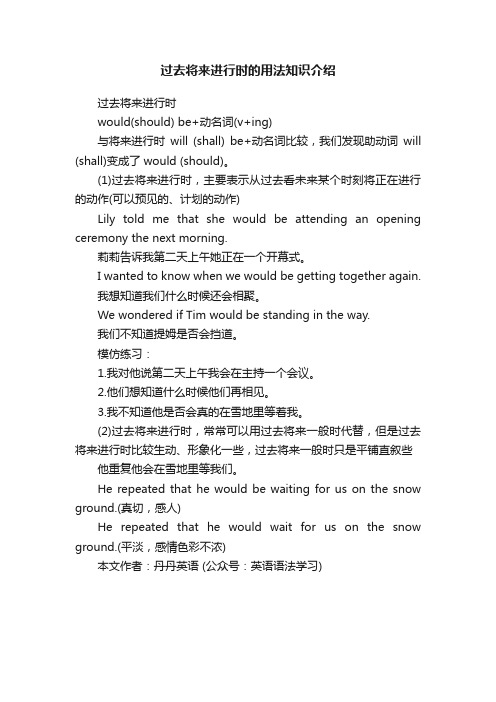
过去将来进行时的用法知识介绍
过去将来进行时
would(should) be+动名词(v+ing)
与将来进行时will (shall) be+动名词比较,我们发现助动词will (shall)变成了would (should)。
(1)过去将来进行时,主要表示从过去看未来某个时刻将正在进行的动作(可以预见的、计划的动作)
Lily told me that she would be attending an opening ceremony the next morning.
莉莉告诉我第二天上午她正在一个开幕式。
I wanted to know when we would be getting together again.
我想知道我们什么时候还会相聚。
We wondered if Tim would be standing in the way.
我们不知道提姆是否会挡道。
模仿练习:
1.我对他说第二天上午我会在主持一个会议。
2.他们想知道什么时候他们再相见。
3.我不知道他是否会真的在雪地里等着我。
(2)过去将来进行时,常常可以用过去将来一般时代替,但是过去将来进行时比较生动、形象化一些,过去将来一般时只是平铺直叙些他重复他会在雪地里等我们。
He repeated that he would be waiting for us on the snow ground.(真切,感人)
He repeated that he would wait for us on the snow ground.(平淡,感情色彩不浓)
本文作者:丹丹英语 (公众号:英语语法学习)。
过去将来进行时
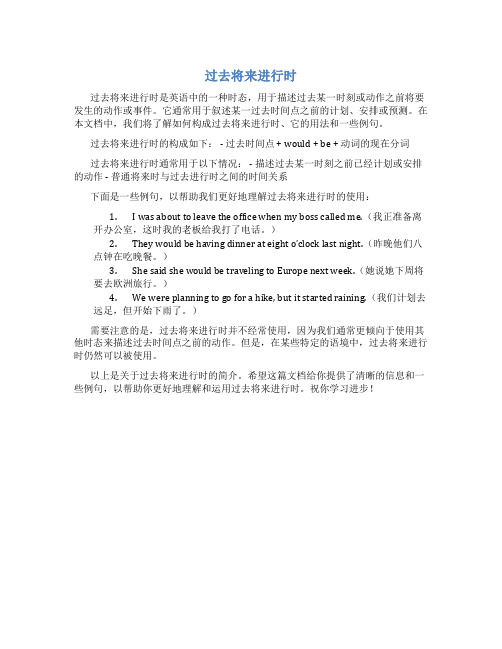
过去将来进行时过去将来进行时是英语中的一种时态,用于描述过去某一时刻或动作之前将要发生的动作或事件。
它通常用于叙述某一过去时间点之前的计划、安排或预测。
在本文档中,我们将了解如何构成过去将来进行时、它的用法和一些例句。
过去将来进行时的构成如下: - 过去时间点 + would + be + 动词的现在分词过去将来进行时通常用于以下情况: - 描述过去某一时刻之前已经计划或安排的动作 - 普通将来时与过去进行时之间的时间关系下面是一些例句,以帮助我们更好地理解过去将来进行时的使用:1.I was about to leave the office when my boss called me.(我正准备离开办公室,这时我的老板给我打了电话。
)2.They would be having dinner at eight o’clock last night.(昨晚他们八点钟在吃晚餐。
)3.She said she would be traveling to Europe next week.(她说她下周将要去欧洲旅行。
)4.We were planning to go for a hike, but it started raining.(我们计划去远足,但开始下雨了。
)需要注意的是,过去将来进行时并不经常使用,因为我们通常更倾向于使用其他时态来描述过去时间点之前的动作。
但是,在某些特定的语境中,过去将来进行时仍然可以被使用。
以上是关于过去将来进行时的简介。
希望这篇文档给你提供了清晰的信息和一些例句,以帮助你更好地理解和运用过去将来进行时。
祝你学习进步!。
- 1、下载文档前请自行甄别文档内容的完整性,平台不提供额外的编辑、内容补充、找答案等附加服务。
- 2、"仅部分预览"的文档,不可在线预览部分如存在完整性等问题,可反馈申请退款(可完整预览的文档不适用该条件!)。
- 3、如文档侵犯您的权益,请联系客服反馈,我们会尽快为您处理(人工客服工作时间:9:00-18:30)。
过去将来进行时
一. 基本结构:
1.过去将来进行时由should(would)+be+现在分词
2.否定:should(would)+not
二. 基本用法:
1.过去将来进行时表示就过去某一时间而言,将来某一时刻或某一段
时间正在进行的动作,主要用于宾语从句中,尤其多用于间接引语中。
举例:
They said they would be coming.
他们说了他们将要来。
(用于间接引语中)
He asked me what I should be doing at six the next day.
他问我次日六点将正在做什么。
(用于间接引语中)
The new job he would be taking was raising racing horses.
他将要接受的新工作是养赛马。
(用于定语从句中)
2.过去将来进行时可以表示在过去某一时间之后即将进行的动作。
举例:
He said he could not come because he would be having a meeting.
他说他不能来因为要开会。
3.过去将来进行时表示在过去将来某一时间正在发生的动作。
它常和表示过去将来的时间状语连用,
但上下文清楚时,时间状语亦可省略。
和将来进行时一样,它也常表计划中的事,不表意愿或打
算。
它还有一个特点,即常用在宾语从句(尤其是间接引语)中。
举例:
John told us that Mary would be coming next day.
约翰告诉我们玛丽第二天来。
I never realized that some day I would be living in China.
我从未想到将来有一天会在中国居住。
She said she would be setting off on the 10 o’clock train.
她说她将乘10点钟的火车走。
4.过去将来进行时有时也可用在其它从句中。
举例:
The new name he would be using was Jack Jones.
他将用的新名是杰克·琼斯。
(用在定语从句中)
He would pay the rest as he would be leaving France.
其余款项,他将在离开法国时付清。
(用在状语从句中)
5.过去将来进行时也可用在独立句中。
The car started. Ellen James would be driving off to the university.
车子发动了。
埃伦·詹姆斯要开车到大学去。
